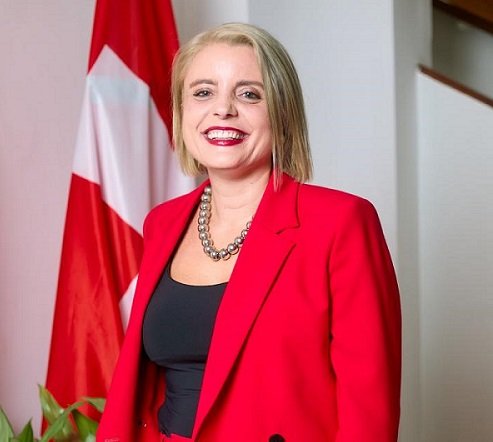The Swiss Ambassador to Ghana, Simone Giger, has urged greater inclusion of women in Ghana’s political landscape, warning that the country risks missing out on crucial leadership potential by sidelining half of its population.
Speaking to The Ghanaian Times in an exclusive interview on Monday, Ms Giger emphasized the importance of gender-balanced leadership in shaping Ghana’s future.
“It is impressive to see how many amazing women Ghana has everywhere — in academia, civil society, the private sector, and the creative arts. A bit less in politics, because politics is a tough terrain,” she observed.
While praising Ghanaian society’s generally progressive outlook on women’s participation in public affairs, Ms Giger pointed out that “in certain spheres, Ghana is doing better than Switzerland, like with women in boardrooms, leading businesses, and state agencies.”
However, she underscored that political representation was equally critical, as it was within the political arena that key decisions shaping the country were made.
She expressed concern over the dismal numbers at the local government level, where women occupied less than two per cent of about 6,000 positions.
Drawing inspiration from Ghana’s peers, Benin and Senegal, the ambassador noted that Benin had introduced a quota system for women in parliament, while Senegal had entrenched gender parity in its constitution — achieving 27 per cent and 47 per cent female parliamentary representation, respectively.
Ghana, by contrast, has only 14 per cent women in its 276-seat parliament. “The figures in Ghana are still far too low,” she remarked. “To build a truly inclusive society, we must take more deliberate steps to encourage and support women in politics.”
“Women have a very distinct view on society, politics, and how things work.
Not tapping into that potential would be a huge loss to the country,” she added.
Ms Giger commended President John Dramani Mahama for appointing Professor Naana Jane Opoku-Agyemang as Ghana’s first female Vice President under the Fourth Republic, describing it as a milestone toward gender parity.
She welcomed the fact that Ghanaians were open to discussing gender issues, calling this attitude a huge step forward.
She also lauded recent government initiatives such as the distribution of sanitary pads to female schoolchildren, plans to boost women’s economic participation through the Women’s Development Bank, and the passage of the Affirmative Action (Gender Equality) Bill.
However, she cautioned that implementation is key, saying “It is deliberate, efficient, and consistent efforts that can bring structural changes and allow female participation to thrive.”
Ms Giger reaffirmed Switzerland’s commitment to supporting the Ghanaian government and local partners in advancing gender inclusion, based on the strong belief that unlocking Ghana’s full potential means ensuring women are no longer left on the sidelines but are active participants in shaping the country’s future.
“This is already a core element of most of our bilateral programmes with government and other development partners. In our small way, the Embassy also supports grassroot initiatives by local partners that emphasise girl-child education and skills training for women.”
As part of this commitment, the Swiss Embassy supports several gender-focused initiatives in Ghana, including GirledUP, a programme encouraging girls to pursue careers in science, technology, engineering, and mathematics (STEM), helping to close the gender gap in these fields.
BY MALIK SULLEMANA
